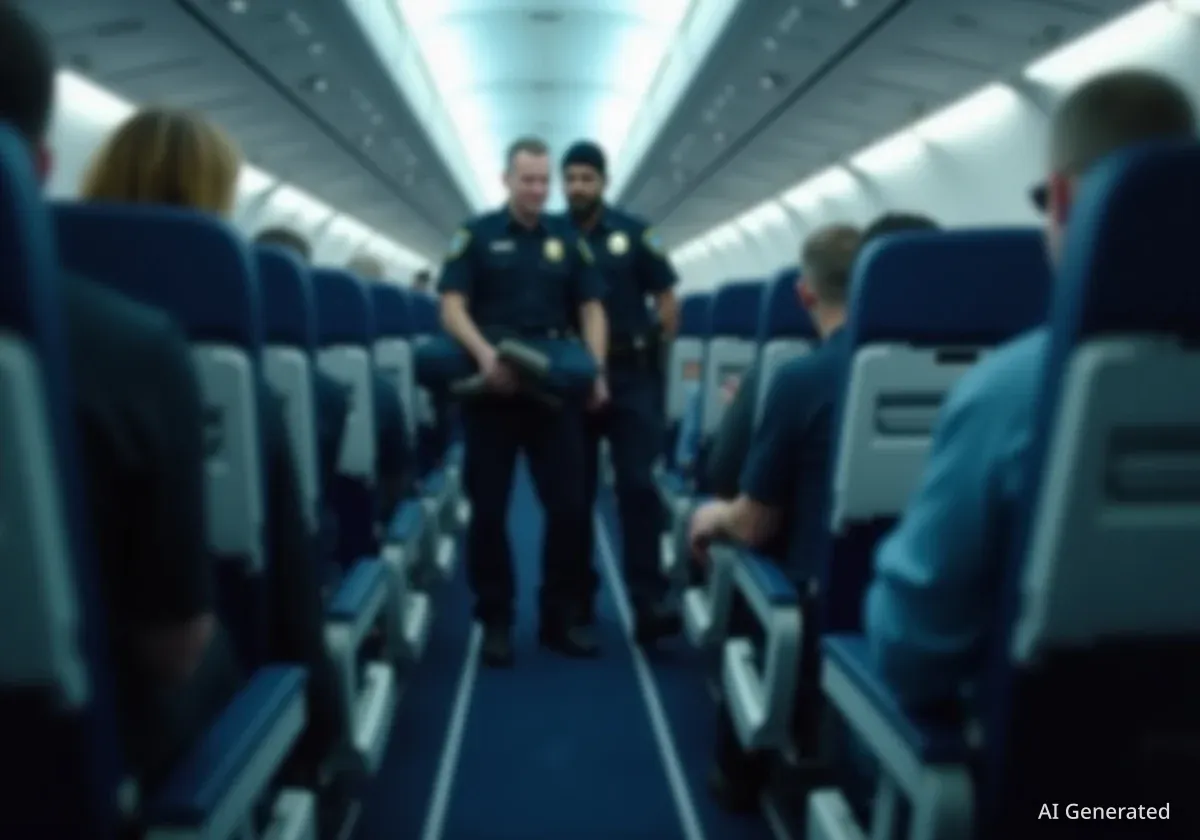A flight from Manchester to Ibiza experienced a delay on September 13 after an intoxicated passenger was removed from the aircraft. The individual reportedly refused to comply with airline staff instructions, including fastening a seatbelt, leading to police intervention before departure.
Key Takeaways
- An intoxicated passenger was removed from a Manchester to Ibiza flight on September 13.
- The passenger refused to fasten his seatbelt and follow crew instructions.
- Police officers performed a "four-limb carry" to remove the individual.
- The incident caused a delay, highlighting challenges for airlines on certain routes.
- UK aviation rules prohibit being drunk on board and require passengers to obey lawful commands.
Incident Details Prior to Departure
The event took place on September 13, before the flight departed from Manchester. Airline crew members initially attempted to address the passenger's behavior. The individual was reportedly intoxicated and did not follow standard safety procedures, such as securing a seatbelt.
When the passenger remained uncooperative, the crew contacted authorities. Two police officers boarded the aircraft to manage the situation. Their presence was necessary to ensure the safety and compliance of all passengers onboard.
Fact: UK Air Navigation Order 2016
Under the UK Air Navigation Order 2016, all individuals on an aircraft must comply with lawful instructions from the flight crew. This includes safety commands like fastening seatbelts. Being intoxicated on board an aircraft is also a specific offense under these regulations.
Police Intervention and Removal
Upon boarding, the officers encountered the uncooperative passenger. They ultimately performed what is known as a "four-limb carry" to remove the individual from the plane. This method involves multiple officers physically carrying a person who is unwilling or unable to move on their own.
The passenger was escorted down the aircraft steps and into a waiting police vehicle. This procedure is a last resort when other methods of de-escalation or persuasion fail. The goal is to ensure the flight can proceed safely and without further disruption.
"Everyone on board must obey the lawful commands—including fastening a seatbelt when instructed. Being drunk on board also is an offence under UK rules."
Impact on Flight Operations
While the passenger was removed, the incident caused a delay for the flight. Such delays are costly for airlines, impacting schedules and potentially leading to missed connections for other travelers. Airlines typically aim to avoid any situation that disrupts their operational timetable.
Interestingly, the police response time for this incident was approximately two hours. This extended wait for law enforcement could potentially affect how liability is assessed, even though the passenger's behavior was the initial cause of the disruption.
Context: Ibiza Flight Dynamics
Flights to destinations like Ibiza, particularly from the UK, are often associated with leisure travel and can sometimes experience a higher incidence of passenger behavior issues. Airlines like Jet2, Ryanair, and easyJet frequently operate these routes, which typically last around two hours and forty-five minutes.
The nature of these routes sometimes presents unique challenges for airline staff in managing passenger conduct. This incident underscores the ongoing need for strict enforcement of aviation regulations.
Airline Policies and Compensation
For airlines, incidents involving unruly passengers are generally classified as "extraordinary circumstances." This classification means that airlines are typically exempt from paying compensation under regulations like UK261/EU261 to other passengers for delays caused by such events. However, they still have a duty of care, which might include providing hotels for passengers if an overnight stay becomes necessary due to a significant delay.
Ryanair, a prominent low-cost carrier, has advocated for stricter limits on alcohol consumption at airports. Their stated reasons include reducing the number of intoxicated passengers on board and minimizing flight disruptions. Some critics suggest this stance also aligns with their commercial interest in monopolizing alcohol sales during flights.
- Airlines often seek to recover costs: European low-cost carriers have increasingly pursued legal action against unruly passengers to recover costs associated with flight diversions or significant delays.
- No diversion in this case: In the Manchester-Ibiza incident, no flight diversion occurred. However, delays still incur significant expenses for airlines due to scheduling disruptions, crew time, and potential knock-on effects.
- Passenger at fault: The passenger's refusal to comply with safety instructions clearly placed the fault on their behavior.
Addressing Passenger Conduct
Airlines face an ongoing challenge in monitoring passenger fitness to fly. While gate staff check boarding passes, a more thorough assessment of a passenger's sobriety can be difficult to implement consistently across all flights. The industry continues to explore ways to prevent such incidents before they escalate.
The incident serves as a reminder of the importance of passenger compliance with airline rules and the legal consequences of disruptive behavior on board aircraft. Adhering to safety regulations is crucial for the well-being of all individuals traveling by air.





